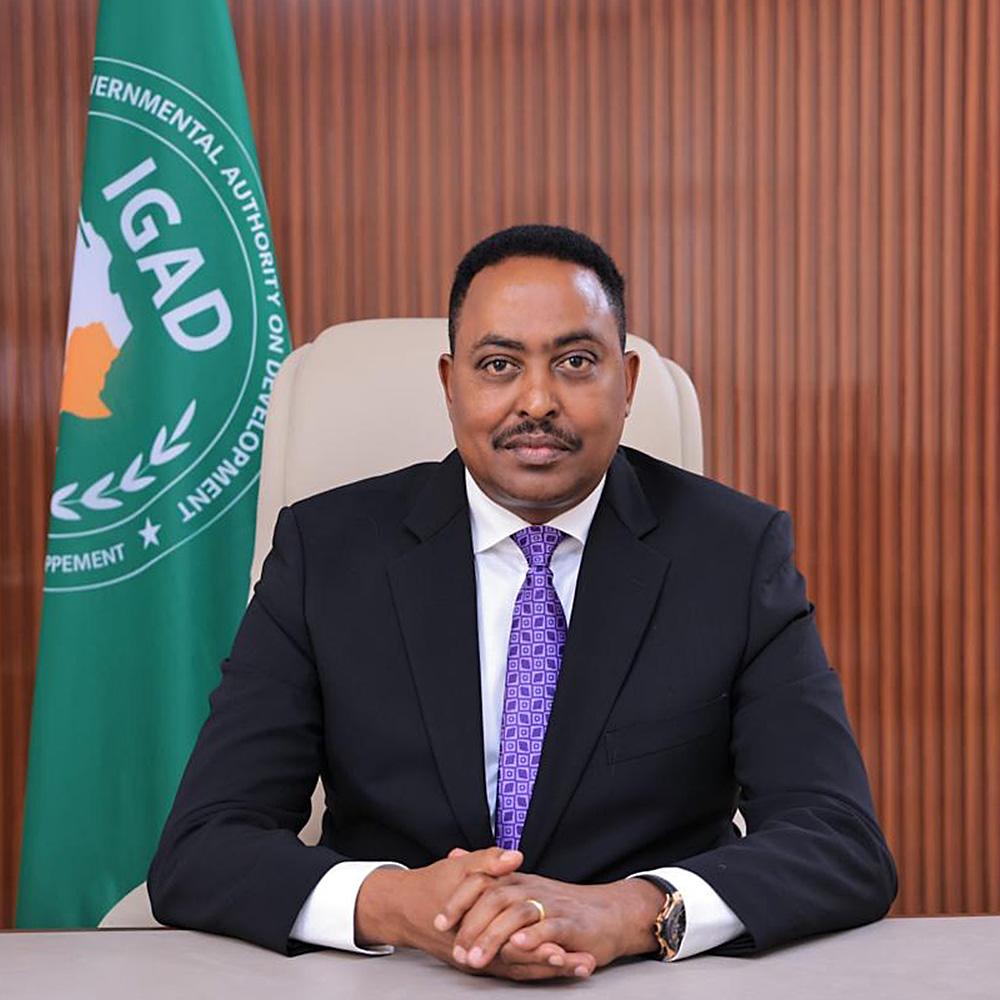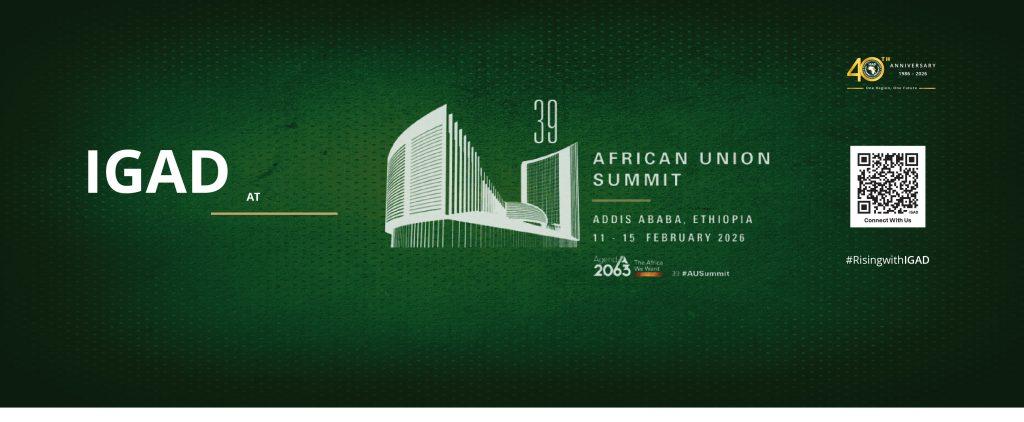Workneh Gebeyehu, PhD.
IGAD Executive Secretary
The Executive Secretary

Profile
Dr. Workneh Gebeyehu was appointed as the Executive Secretary of the Intergovernmental Authority on Development (IGAD) in 2019 during the 13th Ordinary Summit of IGAD Heads of State and Government, held in Addis Ababa, Ethiopia. Since assuming office, he has steered the organisation with a clear vision of strengthening regional cooperation, advancing peace and security, and deepening integration among IGAD Member States.
A seasoned statesman and career public servant, Dr. Workneh has held several high-level positions in the Government of Ethiopia. He served as Minister of Foreign Affairs between 2016 and 2019, where he played a pivotal role in fostering regional diplomacy, promoting Ethiopia’s strategic partnerships, and supporting peace processes across the Horn of Africa. Before this, he served as Minister of Transport from 2012 to 2016, overseeing reforms and policies that modernised Ethiopia’s infrastructure and enhanced connectivity within the country and the region. His earlier service was in the Oromia Regional Government, where he rose through the ranks in the areas of administration and security.
Born in 1970 in the town of Shashamane in Oromia, Ethiopia, Dr. Workneh pursued higher education at Addis Ababa University, earning both a Bachelor’s and a Master’s degree in International Relations. He later advanced his academic career with a PhD in Criminology from the University of South Africa (Unisa) in Pretoria, demonstrating his deep commitment to research, governance, and the rule of law.
Beyond his professional career, Dr. Workneh is a devoted family man, married and a father of three. His leadership at IGAD continues to be informed by his lifelong dedication to public service, his belief in the power of regional cooperation, and his commitment to building a more peaceful, secure, and prosperous Horn of Africa.
Office of the Executive Secretary
The Office of the IGAD Executive Secretary (ES) is well regarded and highly placed in the hierarchy of the regional organization. According to the Agreement Establishing IGAD (the Agreement), the holder of this office is described as the chief executive officer of the organization and acts as its bona fide spokesman.
Indeed, Article 3 of the Agreement points out, in part that IGAD shall, in the exercise of its legal personality, be represented by the ES. He shall act in the aforementioned capacities and perform “such other functions as are entrusted” to him by the Summit of the IGAD Heads of State and Government, and the Council of Ministers as clearly stipulated in the terms of reference.
The Agreement further empowers the ES to “bring to the attention of the Summit and Council any matter which in his opinion may threaten the maintenance of regional peace and security”. In addition, the Agreement also defines the powers of the office and grants its occupant considerable scope for action. The day-to-day work of the ES includes managing the daily affairs of the IGAD Secretariat, consulting with government officials of IGAD Member States and representatives of development partners, as well as representing IGAD at various international and regional forums. One of the most critical roles that he plays using his office and authority is to prevent regional disputes from arising, escalating, or spreading.
This is often done publicly and in private, drawing upon his independence, impartiality, and integrity. Furthermore, the ES is charged with the responsibility of advocating and building the image of the organization and the region. The office bearer travels worldwide to mobilize necessary resources to run the organization’s programmes and to keep the leadership and the people of the region informed about the vast array of issues of concern that are on the organization’s agenda at any given time.
Each year, the ES produces a detailed annual report that documents results of its activities/projects and programmes and outlines future priorities.Hence, the overall duties and responsibilities of the office bearer can be summed up to include, providing strategic leadership within the mandate of IGAD, as well as to the senior management team and staff so as to build and sustain the organization’s role as a key regional player in peace and security, economic cooperation and integration, trade and development activities.The current ES, Dr. Workneh Gebeyehu is the sixth since the organization was established in 1986. A national of Ethiopia, he took over from Amb. Mahboub Maalim in November 2019.
IGAD Structure
The Intergovernmental Authority on Development is comprised of four hierarchical policy organs as shown in the Figure 1 below:
- THE ASSEMBLY OF HEADS OF STATE AND GOVERNMENT is the supreme policy making and regulatory organ of the IGAD. It determines the objectives, guidelines and programmes for IGAD and meets once a year. A Chairman is elected from the Member States in rotation.
- THE COUNCIL OF MINISTERS is composed of the Ministers of Foreign Affairs and one other Focal Minister designated by each member state. The Council formulates policy, approves the work programme and annual budget of the Secretariat during its biannual sessions.
- THE COMMITTEE OF AMBASSADORS is comprised of IGAD Member States’ Ambassadors or Plenipotentiaries accredited to the country of IGAD Headquarters. It convenes as often as the need arises to advise and guide the Executive Secretary.
- THE SECRETARIAT is headed by an Executive Secretary appointed by the Assembly of Heads of State and Government for a term of four years, renewable once. The Secretariat assists Member States in formulating regional projects in the priority areas, facilitates the coordination and harmonisation of development policies, mobilises resources to implement regional projects and programmes approved by the Council and reinforces national infrastructures necessary for implementing regional projects and policies.
The Executive Secretary is assisted by Divisions responsible for:
- Agriculture and Environment;
- Economic Cooperation and Regional Integration;
- Health Social Development;
- Peace and Security;
- Administration and Finance; and
- Planning Coordination and Partnerships
Besides the mentioned Divisions at the Headquarters in Djibouti, IGAD has a number of specialized institutions and Programmes hosted by other Member States. These include the IGAD Conflict Early Warning and Response Mechanism (CEWARN), the IGAD Security Sector Programme (ISSP), the IGAD Centre for Pastoral Area and Livestock Development (ICPALD) and IGAD Climate Prediction and Applications Center (ICPAC), and the IGAD Regional Aids Programme (IRAPP).
Read More

